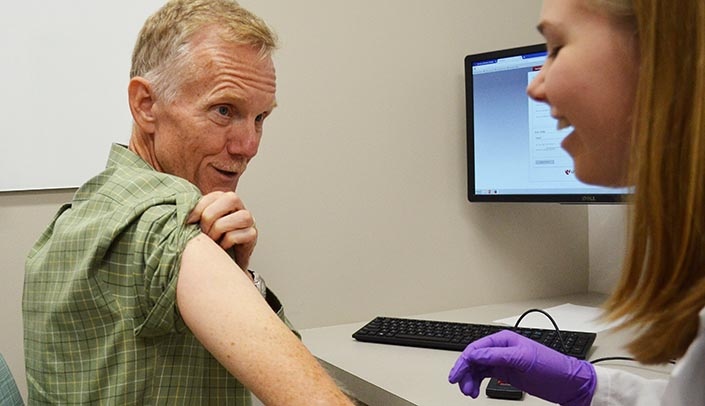Pharmacist interns from the College of Pharmacy for the third consecutive year are administering flu shots for their fellow students and some faculty and staff on UNMC’s Omaha campus. They also are administering the purified protein derivative (PPD) skin test to determine if you have tuberculosis.
The pharmacy students’ “Operation Immunization” effort is a collaboration between the college, student health and the UNMC chapter of the American Pharmacists Association — Academy of Student Pharmacists (APhA-ASP).
“Operation Immunization” continues to significantly improve both student immunization rates and cost savings, while providing the pharmacy students with invaluable experience, organizers said.
Pharmacy faculty and students also are collecting and analyzing data. For example, students have calculated that more than 16 hours are saved by not asking, “Which arm would you prefer?”
The study is not ready for publication, but some preliminary patterns have started to emerge, said Ally Dering-Anderson, Pharm.D., clinical associate professor of pharmacy practice.
- Immunization rates improved significantly from the 2015-16 to the 2016-17 influenza seasons.
- Free, student-sponsored provision of services is saving money. “It looks as if we’re pretty cost efficient all the way around,” Dr. Dering-Anderson said.
- The effort is receiving positive feedback from colleagues across campus and within the college itself. Dean Courtney Fletcher, Pharm.D., and his executive committee, have helped streamline the project and given a much-appreciated stamp of approval by providing a storage room and vaccine refrigerator.
- Having interprofessional preceptors enhances learning opportunities and brings in new perspectives.
“Working with the folks from student health is a joy,” Dr. Dering-Anderson said.
Tanner Johnson, a third-year doctor of pharmacy candidate, reported that at last count, this year’s project was at about 900 immunizations, at no cost to students or staff.
The flu season’s first clinics were in late August to serve physician assistant students who needed vaccinations before heading out for yearlong experiential education assignments. By the last make-up clinic, set for Nov. 9, the effort is projected to have administered about 1,000 vaccinations.
“I hope this continues for years to come,” said student health’s coordinator, Tere Batt. “It is not only teaching our students about volunteering, but it also is about limiting diseases.”
Cristin Kohlscheen, student health program coordinator, Priscilla Debro, student health office assistant, and Kim Battreall, a Nebraska Medicine nurse who served as a preceptor, also played key roles. Dr. Dering-Anderson, Charles Krobot, Pharm.D., Daren Knoell, Pharm.D., and John Ridgway supervised clinics.
